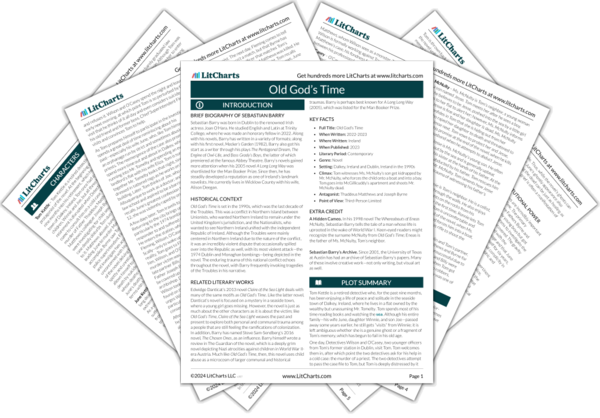In Old God’s Time, the sea is a symbol of healing and belonging. The novel’s protagonist, Tom Kettle, is unmoored in a variety of ways. As an orphan, he never had a place he could truly call home; in retirement and after the death of his family, he’s lost his two significant identities as father/husband and detective. Further, his failing memory isolates him in a variety of ways. However, the sea often functions as a grounding force for him in his moments of aimlessness and distress. For instance, on the train ride to Dublin, Tom looks out at the sea and feels as though it’s the only place he feels truly belongs to him, since everywhere else he’s been is not truly his home and has traumatic memories attached to it. In this way, the sea becomes a sort of neutral space for Tom where he can find emotional fulfillment despite the numerous traumas of his life. The sea’s important role in Tom’s life is encapsulated at the end of the novel, where Tom swims in the channel after killing Ms. McNulty’s abusive husband and finally finds peace with his life in all its beauty and tragedy. Thus, the ocean is instrumental in Tom healing from the trauma and uncertainty that has plagued him throughout the entire narrative.
The Sea Quotes in Old God’s Time
There he saw the little boy who had arrived at Christmas with his mother, to the Turret Flat, come running into view. He had some sort of unusual stick in his hand. A black cane, with a silver knob—like Fred Astaire might use for dancing. He was flailing it about in the wind. The square of hedges around the sheltered spot that Mr Tomelty had created, or an earlier owner, was bending and shuddering, like a circle of powerful horses. Threshing the bitter grain of life. The little boy was soundless because the window was closed, but Tom adjudged he must be singing. The child was now twirling himself all about, as if the cane had not been enough of a thing to be twirling, in his short trousers, happy in the wind, the cold, oblivious.
He cradled the memory of his wife as if she were still a living being. As if no one had been crushed, no one had been hurried from the halls of life, and the power of his love could effect that, could hold her buoyant and eternal in the embrace of an ordinary day. The sunlight struck its million pins into the pollocky sea, the whole expanse sparked, and sparkled, as if on the very verge of a true conflagration. Alone, alone, he smiled and smiled. He closed his eyes. He opened them. The sea was still there.
If he were looking for citizenship, it might be of this miraculous bay. Child of nowhere, he could claim rights over this, this vast vacancy queerly filled, both empty and full. He was just an old policeman with a buckled heart, but if he had known how, he would have sucked the whole vista into himself, every grain of salt and sand and sea, swallowed it whole, like one of those old whales in the loved museum, like a monster in an ancient story. [...] He knew, he knew he was in trouble, he could sense the trouble with his copper’s instinct and didn’t yet know its shape, but the bay also released him somehow, let him go for a blessed minute into some wild freedom, so that his heart and soul were both shaken and renewed, in the same moment, in the same breath.
He hadn’t been obliged to shoot his rifle for many many years. There seemed to be a component of light also in this scope that he couldn’t see the origin of. There were the cormorants right in front of his nose, it seemed like, and the very barnacles on the black rocks, and the heavy skirts of dark brown seaweed, shrugging in the late tide. It had an aspect cold and wild. The cormorants looked like they had been carved violently out of the dark rocks. He wondered what it would be like to pull the trigger softly, ease his index finger through the small arc of it, and peg a bullet into a breast, and watch the bird fall, far far off and yet so near. But he knew in his heart he would never pull the trigger.
Even the man highest up thought he should take early retirement, but something deep in him needed to go on to the end. Then the little party and the sombre words and the happy words. Then his niche in Queenstown Castle. His wicker chair, the characterful sea, and the stolid island. And then, those quiet nine months not only of new silence, but also—what could he call it? A sort of blossoming sense of relief, maybe, that the wretched Fates had done with him. Had noticed his great happiness long ago, and emblem by emblem taken it away from him. Then the day that Wilson and O’Casey came to him like Mormons, with the old rhododendron aflame at their backs. The screeching of the door and the whole thing cranked up again, like a Model T Ford.












